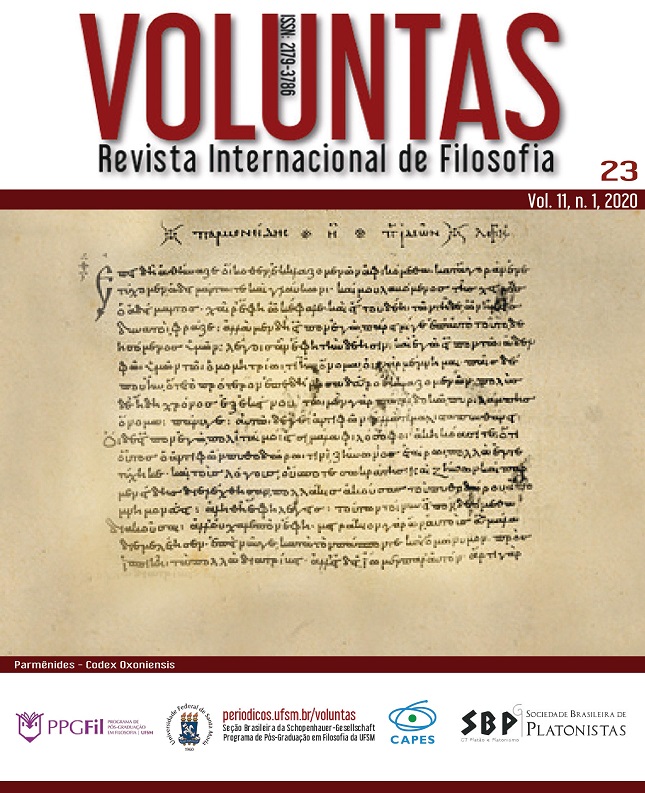Plato’s “Parmenides” revisited
DOI:
https://doi.org/10.5902/2179378643269Keywords:
Parmenides, Impurity of the Sensibles, Purity of the Forms, Participation, DeductionsAbstract
Plato’s Parmenides is a notoriously challenging dialogue. To provide a completely satisfying interpretation of it, each argument needs to be reconstructed on its own terms and if all the reconstructions are accurate, the logical interconnections among the arguments of both parts of the dialogue should reveal the overall message of the Parmenides. Here I would like to summarize my interpretation, and consider a few prominent objections and alternatives to it, particularly as they appear in the work of Constance Meinwald and Mary Louise Gill. I want to explain why Meinwald’s interpretation is significantly less persuasive than mine and, because Gill and I reach similar conclusions, I want to highlight the important differences between our interpretations.Downloads
References
GILL, M. L. Philosophos: Plato’s Missing Dialogue. Oxford: Oxford University Press, 2012.
GILL, M. L. Introduction to Plato: Parmenides. Indianapolis/Cambridge: Hackett Publishing Company, 1996, pp. 1-123.
MEINWALD. C. C. Plato’s Parmenides. New York: Oxford University Press, 1991.
MEINWALD. C. C. Good-bye to the Third Man, In: KRAUT, R. (ed.). The Cambridge Companion to Plato. Cambridge: Cambridge University Press, 1992, pp. 365-396.
MEINWALD. C. C. How Does Plato’s Exercise Work?, Dialogue, 53, 2014, pp. 465-494.
PETERSON, S. Plato’s Parmenides: A Principle of Interpretation and Seven Arguments, Journal of the History of Philosophy 34, 1996, pp. 167-192.
PETERSON, S. The Language Game in Plato’s Parmenides, Ancient Philosophy, 20, 2000, pp. 19-51.
PETERSON, S. New Rounds of Exercise in Plato’s Parmenides, Modern Schoolman, 80, 2003, pp. 245-278.
PETERSON, S. The Greatest Difficulty for Plato’s Theory of Forms: The Unknowability Argument of Parmenides 133c-134c, Archiv für Geschichte der Philosophie, 63, 1981, pp. 1-16.
RICKLESS, S. How Parmenides Saved the Theory of Forms, Philosophical Review, 107, 1998, pp. 501-554.
RICKLESS, S. Plato’s Forms in Transition. Cambridge: Cambridge University Press, 2007.
RICKLESS, S. Plato’s Parmenides, The Stanford Encyclopedia of Philosophy (Spring 2016 Edition), Edward N. Zalta (ed.), URL = https://plato.stanford.edu/archives/spr2016/entries/plato-parmenides/
SAYRE, K. Plato’s Late Ontology: A Riddle Resolved. Princeton: Princeton University Press, 1983.
SAYRE, K. Parmenides’ Lesson: Translation and Explication of Plato’s Parmenides. South Bend: University of Notre Dame Press, 1996.
VLASTOS, G. The Third Man Argument in the Parmenides, Philosophical Review, 63, 1954, pp. 319-349.
Published
How to Cite
Issue
Section
License
The submission of original manuscripts to this journal implies the transference, by the authors, of the copyrights for printed and digital publication. The copyrights of a published manuscript belong ultimately to the author, and only the copyright for its first publication is reserved to the journal. Authors may only use the same results in other publications explicitly indicating this journal as the medium of the original publication.
Licence
Attribution-NonCommercial-ShareAlike 4.0 International (CC BY-NC-SA 4.0) - This license lets others remix, tweak, and build upon your work non-commercially, as long as they credit you and license their new creations under the identical terms.






